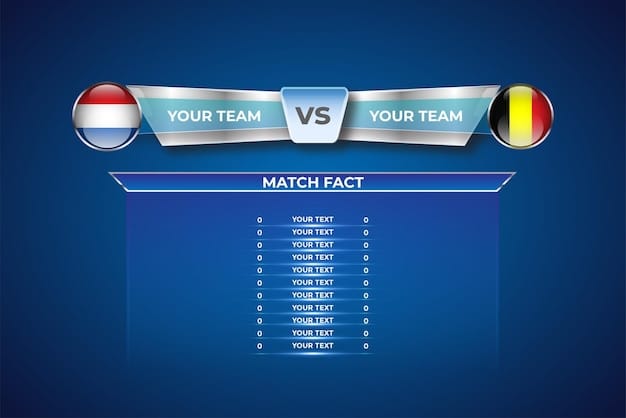MLS Playoff Format: Fair or Flawed? Analyzing Competitive Balance

The MLS playoff format aims to crown a champion, but questions linger: Does it fairly represent regular-season success, and does it truly maximize competitive balance among all teams?
The MLS Playoff Format: Is It Fair and Does It Maximize Competitive Balance? This is a question that sparks debate among fans, players, and analysts alike. While the playoffs provide excitement and high-stakes matches, concerns remain about whether the system truly rewards the best teams and fosters a level playing field.
Understanding the Current MLS Playoff Structure
The MLS playoff system has evolved over the years, but the current structure involves a single-elimination bracket featuring the top teams from both the Eastern and Western Conferences. It’s a system designed to create dramatic moments, but also one that invites scrutiny regarding its fairness.
Understanding the intricacies of the current format is crucial to assessing its strengths and weaknesses. Let’s delve into the details of how teams qualify and advance.
How Teams Qualify for the Playoffs
The top seven teams from each conference automatically qualify for the playoffs, based on their regular season point totals. This means that fourteen teams in total will fight for the MLS Cup. This setup is meant to reward consistent performance throughout the long regular season, but also leaves the door open for late-season surges.
Advancement Through the Tournament
The playoffs themselves are a single-elimination tournament. This structure favors teams that can perform under pressure in a one-off match, while potentially penalizing teams that had a stronger regular season but stumble in a single game. The road to the MLS Cup is fraught with potential upsets and dramatic finishes.
- Single-elimination creates high-stakes moments.
- Home-field advantage is awarded to the higher seed.
- Potential for lower-seeded teams to make deep runs.
In essence, the current MLS playoff structure sets the stage for a thrilling, unpredictable, and sometimes controversial conclusion to the season.

Arguments for the Fairness of the MLS Playoff Format
Advocates of the current MLS playoff format argue that it provides a level of excitement and unpredictability that enhances the league’s appeal. They claim it creates captivating narratives and memorable moments that resonate with fans.
Let’s explore the key arguments in favor of the existing system.
The current system arguably does a good job to bring excitement to a league that otherwise will not garner much attention from casual fans. As more money infuses the sport in the US, many are starting to argue that changes need to be made, but are they right?
The Excitement Factor
The single-elimination format inherently injects drama into every playoff match. Any team can win on any given day, leading to unexpected upsets and memorable performances. This unpredictability keeps fans engaged and invested in the outcome.
Rewarding Clutch Performances
The playoffs are a test of a team’s ability to perform under pressure. Teams that can rise to the occasion and deliver in crucial moments are rewarded, regardless of their regular season record. This adds another layer of intrigue and excitement to the proceedings.
- Single-game elimination amplifies the importance of each match.
- Underdogs have a legitimate chance to advance.
- Creates compelling storylines and rivalries.
Proponents of the current system believe the excitement and opportunity for clutch performances outweigh any perceived unfairness.
And while this is true, it is fair to say that no one remembers the team that underperformed in the playoffs.
Criticisms of the MLS Playoff Format: Concerns about Fairness
Critics of the MLS playoff format contend that it does not adequately reward regular season success and can lead to situations where the best team is eliminated early due to the vagaries of a single-elimination tournament.
The concerns about fairness often revolve around the impact of randomness and the potential for imbalances in the bracket.
There is no question that the single-elimination style of play may not be in the best interest of rewarding and recognizing the best performing teams in the league.
Diminished Value of Regular Season Performance
With so many teams qualifying for the playoffs, the regular season loses some of its significance. A team that barely sneaks into the playoffs has the same chance of winning the MLS Cup as the team with the best regular season record.
The Impact of Randomness
A single bad call, a lucky bounce, or an off day can derail a team’s entire season in the playoffs. This element of randomness can undermine the fairness of the competition, especially when compared to systems that reward consistent performance over a longer period.
- Single-game elimination can be influenced by chance.
- Home-field advantage isn’t always a decisive factor.
- Potential for unbalanced brackets favoring some teams.
Critics argue that the current format allows for too much variance and does not consistently crown the most deserving champion.

Exploring Alternative Playoff Formats for MLS
Given the ongoing debate about the fairness and competitive balance of the current MLS playoff format, it’s worth exploring alternative systems that could potentially address some of the perceived shortcomings.
Several other leagues around the world employ different playoff structures, each with its own set of advantages and disadvantages.
There is not a one-size-fits-all approach to making sure the best performing team walks away with the trophy, but many have tried, and many have failed.
Two-Legged Series
A two-legged series, commonly used in European soccer competitions, would involve teams playing each other twice, once at home and once away. The aggregate score determines the winner, rewarding teams that can perform consistently over two matches.
Best-of-Three Series
Similar to other sports leagues, a best-of-three series would require a team to win two games to advance. This format would reduce the impact of a single bad game and provide a more accurate reflection of a team’s overall strength.
- Two-legged series reward consistent performance over two matches.
- Best-of-three series reduce the impact of single-game randomness.
- Group stage formats can provide more meaningful matches.
The MLS could learn from other leagues and explore alternative playoff formats to enhance fairness and competitive balance.
The Role of Home-Field Advantage in MLS Playoffs
Home-field advantage plays a significant role in the MLS playoffs, but its impact can vary depending on the team, the stadium, and the specific circumstances of the match. In the current structure, the higher seed gets this edge.
While home-field advantage can provide a boost, it’s not always a guarantee of victory.
The Impact of Fan Support
Playing in front of a passionate home crowd can energize a team and create a hostile environment for the opposition. The support of the fans can be a tangible advantage, especially in high-pressure situations.
Travel and Familiarity
Teams traveling to away matches can face challenges related to travel fatigue and unfamiliar surroundings. Home teams benefit from being in their usual routines and playing on a familiar field.
- Home-field advantage can provide a psychological boost.
- Familiarity with the stadium and surroundings is beneficial.
- Travel can fatigue teams and disrupt their preparation.
While home-field advantage is valuable, teams need more than just fan support to succeed in the playoffs.
Balancing Excitement and Fairness in the MLS Playoff Format
The MLS faces the challenge of balancing the excitement and unpredictability of the playoffs with the need to ensure fairness and reward regular season success. Finding the right balance is crucial for the long-term health and integrity of the league.
There is no easy solution, but a thoughtful approach that considers the perspectives of all stakeholders is essential.
Perhaps the fairest outcome would be to get rid of playoffs altogether, but the league is aware that this will take away excitement, and ultimately, eyeballs from the sport.
Potential Reforms and Compromises
The MLS could consider reforms such as awarding greater advantages to higher seeds, implementing a points-based system for playoff qualification, or experimenting with different playoff formats.
Engaging Stakeholders in the Discussion
The league should engage with fans, players, coaches, and analysts to gather feedback and explore potential solutions. A collaborative approach is more likely to lead to positive outcomes.
- Exploring reforms that reward regular season success.
- Considering alternative playoff formats.
- Engaging all stakeholders in the discussion.
Striking the right balance between excitement and fairness is an ongoing process that requires continuous evaluation and adaptation.
| Key Point | Brief Description |
|---|---|
| 🏆 Playoff Format | Single-elimination format favoring teams that play well in the clutch. |
| ⚖️ Fairness Concerns | Doesn’t always reward regular season champions due to single-game variance. |
| 🏟️ Home Advantage | Higher seeds benefit, but it’s not a guaranteed path to victory. |
| 🔄 Alternative Formats | Two-legged series or best-of-three could balance excitement and fairness. |
Frequently Asked Questions
▼
The top seven teams from both the Eastern and Western Conferences qualify for the MLS playoffs, totaling fourteen teams competing for the MLS Cup.
▼
Yes, the MLS playoffs use a single-elimination format, meaning each game is crucial, and the losing team is immediately out of the competition.
▼
Home-field advantage is awarded to the higher-seeded team in each playoff match, providing them with the benefit of playing in front of their home fans.
▼
Some criticisms include that the single-elimination format doesn’t always reward the best regular-season team and can be heavily influenced by chance and random events.
▼
MLS could explore using a two-legged series or a best-of-three format to reduce the impact of single-game variance and better reward consistent performance.
Conclusion
The MLS Playoff Format: Is It Fair and Does It Maximize Competitive Balance? remains a complex question with no easy answer. While the current system provides excitement and drama, it also faces criticism for potentially undermining the value of regular season success. As the league continues to evolve, ongoing evaluation and potential reforms could help strike a better balance between entertainment and fairness.





